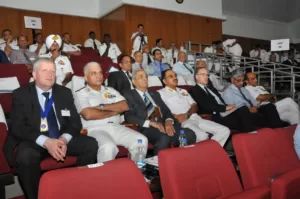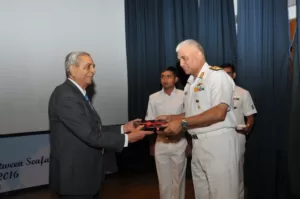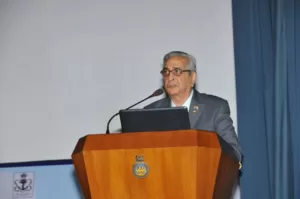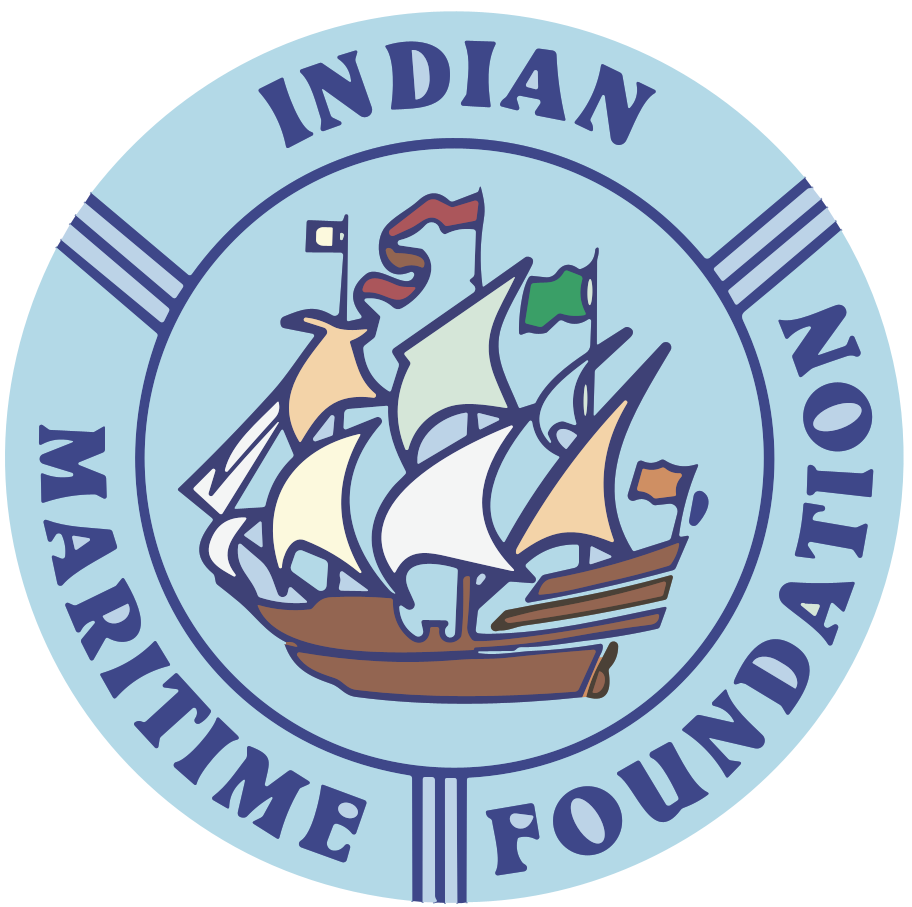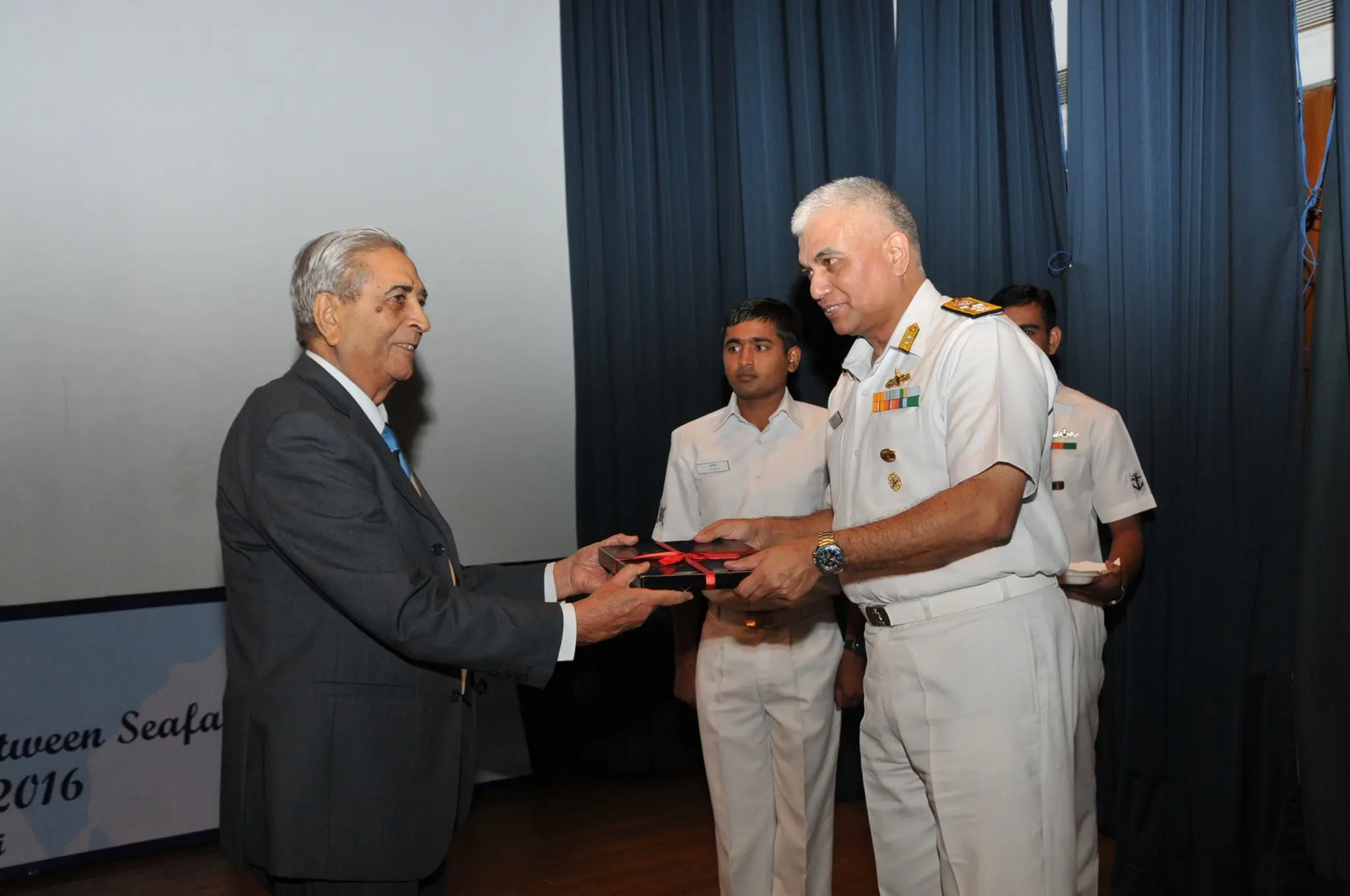
Joint WNC IMF Seminar 2016
Introduction
The fourth in a series of cooperative seminars which began in 2012 at the behest of the Navy, the IMF and the Nautical Institute London, was held at the INHS Aswini Auditorium on 05 May 16. It was indeed heartening to see members of the maritime fraternity mingle and discuss various issues and present papers of seafaring interest. Among those present were RAdm SY Shrikhande, Flag Officer Doctrines and Concepts (FODC), Cmde Rajan Vir (Rtd), President of IMF, Capt Shrikant Limaye, Secretary of the Nautical Institute, India West Branch at Mumbai. Also present were senior personnel from the Indian Navy, merchant marine industry, Coast Guard, as well as representatives of various shipping companies, including some senior stalwarts who were instrumental in shaping the present maritime industry.
We were fortunate to have Mr Philip Wake, CEO and Capt Robert Mc Cabe , President of the Nautical Institute, London. Capt McCabe would soon be relinquishing his responsibilities after a very illustrious tenure of two years.. The fact the Mr Wake has been awarded the OBE by the Queen shows the importance the UK attaches to the seafaring industry.
Opening Address by Cmde Rajan Vir
The seminar started at 0900 hrs with an opening address by Cmde Rajan Vir (Rtd), President of IMF, who welcomed all present and traced the genesis of this seminar and how it had progressed. He also thanked the Navy, specially the Flag Officer Commanding – in-Chief, Western Naval Command for giving his approval to hold this seminar. He noted with satisfaction that there is indeed a sense of ownership and participation with all people involved with the sea in India and it is gathering momentum. He stressed, that like everything else, this requires constant nurturing.
Address by Capt Robert McCabe
Capt Robert McCabe addressed the audience and apprised them of the issues they are grappling with in UK, the state of the maritime industry in the future and the need to prepare and adapt to it now. Also, how the whole gamut of seafaring culture is changing with technological advances taking place. He explained how the Nautical Institute, London was taking a lead by interacting with the IMO and the industry to lay the foundations for this change, including the regulatory frameworks.
Keynote Address by R Adm SY Shrikhande, FODC
The Keynote Address was delivered by R Adm SY Shrikhande, FODC in which he stressed the importance of all stakeholders in the maritime community to work together to enhance the further development of the maritime industry which is at the cusp of a break-through in line with the country’s economic development and how there was a special focus on maritime affairs. Also to think ahead of the ‘curve’, so that regulatory rules can be made to avoid maritime disasters and not the other way round as has been the case so far.
Session I
Talk by Capt KN Deboo
The first speaker for the day was Capt KN Deboo, who spoke of the special requirements for navigation and challenges faced while sailing in the Arctic waters. He explained the reason for opening this route due to the effects of global warming and also because it reduced the distance to be covered for the affected countries. Since he had been on a ship that had sailed these waters without an escort ice-breaker he explained the specification of the type of ship which could do this journey and the cost-effectiveness of such a venture. As also the navigation challenges one experiences in the high latitudes. Since it is an expensive proposition it was not economical to undertake such voyages, especially due to low oil prices. In fact, none have been done for the last year, and earlier also it was just a handful.
Talk by Capt KD Bhai
Capt KD Bhal spoke about the quality control regime for merchant ships. He gave an overview of how the ships are expected to adhere to various mandatory rules and codes during their operational period and how the authorities responsible for it ensure compliance by various types of inspections. This is becoming all the more necessary due to serious environmental and human resource concerns in the industry, considering the increase in movement of goods by sea. He however lamented that the Indian maritime industry has not kept pace with normal stringent standards in most countries and the Indian merchant fleet and its infrastructural services needed to be upgraded.
Talk by Capt Limaye
The last speaker for the morning session was Capt Limaye from the Nautical Institute in Mumbai. He explained the static electricity hazards faced by tankers carrying dangerous cargo. Basically, how static electricity is a danger for tanker operations and the methods taken to mitigate this hazard.
Summing Up by Moderator
Mr Philip Wake who moderated this session thanked all the speakers and emphasized the importance of a proactive attitude towards regulations and training due to the fast technological changes taking place in the industry. Capt Robert Mc Cabe presented an award of NI Fellowship to Mr Sanjeev Vakil.
Session II
The next session dealt with coastal security and the services rendered by Coast Guard.
Talk by Speaker I
The first speaker dealt with information sharing architecture in the Western Indian Ocean and explained the various linkages with the Indian Ocean rim countries.
Talk by Cdr KS Balaji
Cdr KS Balaji gave an informative presentation of all aspects of coastal security and the various methods employed, as also the problems faced which are peculiar to our waters. Specially with regards to the coordination required by the myriad of agencies involved in coast security. It was heartening to hear about the positive response from fishermen during their interaction.
Talk by CG rep
The Coast Guard representative gave an overview of their activities. He then narrated a few SAR and antipollution activities they had been involved in and the lessons learnt.
Summing Up by Moderator
This session was moderated by Cmde AK Agarwal, NOIC (Mah) who thanked all speakers for their excellent presentations and he stressed the need for greater cooperation between all stakeholders and how coastal security has now become an important facet of maritime defense and assets are being built up at all levels.
Vote of Thanks
The seminar ended with a vote of thanks by Capt N Dholakia from the NI, Mumbai. This was followed by sumptuous lunch hosted by HQ, Western Naval Command.
